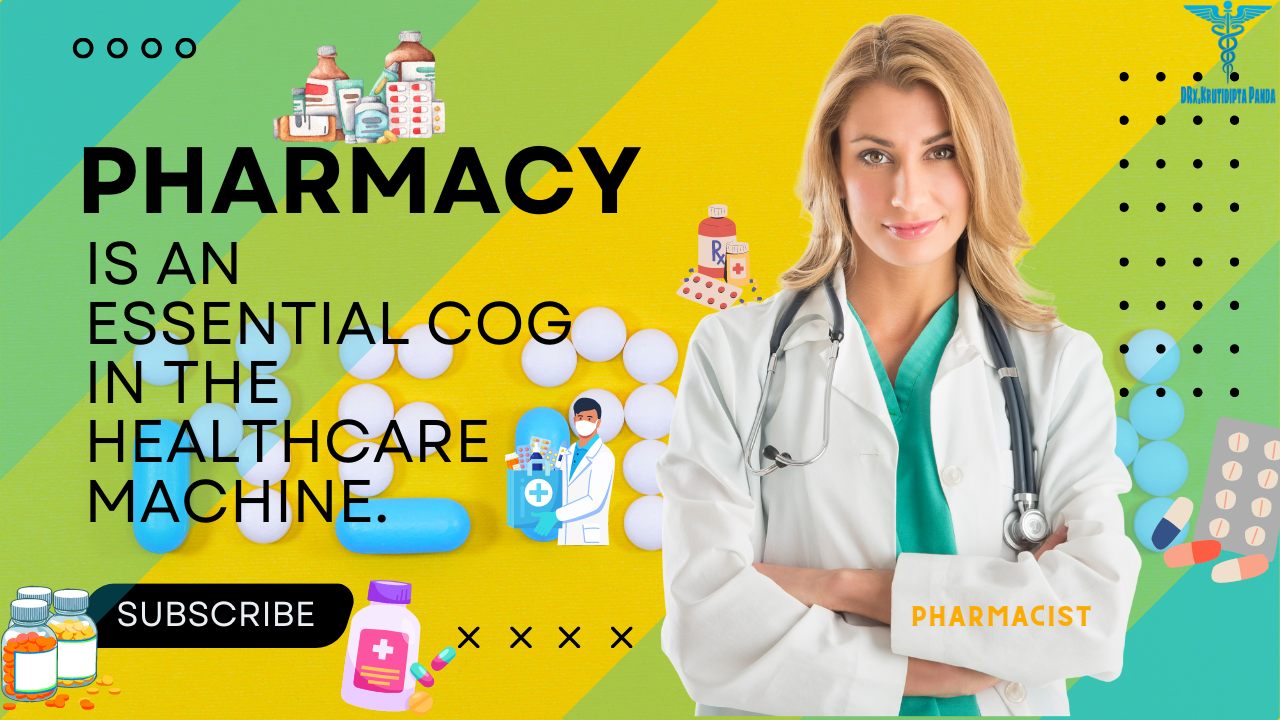Pharmacy’s the art and science of compounding and dispensing drugs or preparing suitable dosage forms for the administration of medication to man or animals. It includes collection and identification. Purification, isolation, synthesis, standardization, and internal control of medicinal substances. The large-scale manufacture of medicine is termed Pharmaceutics. It’s primarily a technological science.
A Deep Dive into the World of Pharmacy: The Heartbeat of Healthcare
Explore the multi-faceted world of Pharmacy, a critical component in the healthcare continuum. Understand its role, challenges, and future perspectives in this comprehensive guide.

Introduction of Pharmacy
Well, if it isn’t the world of Pharmacy, we’re diving into it today! A vast universe of its own, with its roots embedded deeply into the heart of our healthcare system. You see, pharmacies are more than just places where you grab your prescriptions after a doctor’s visit. They serve as a crucial bridge between healthcare professionals and patients, aiding in the treatment, prevention, and understanding of diseases.
Pharmacy: The Unsung Hero of Healthcare
An Overview
Pharmacy is an essential cog in the healthcare machine. Its primary goal is to ensure that medications are used effectively and safely. In essence, it’s where science meets patient care, providing a vital link in the health services chain.
The Many Hats Pharmacists Wear
Pharmacists are like the Swiss army knives of healthcare; they play numerous roles. They dispense prescriptions, advise on medication usage, provide vaccinations, and even conduct health and wellness screenings. These folks aren’t just pill dispensers but healthcare superheroes without capes.
Types of Pharmacies: It’s More Than Just a Store
Community Pharmacies
Community pharmacies are the places where people go to fill their prescriptions. They are the people’s first point of contact with doctors and nurses.
Hospital Pharmacies
Situated within hospitals, these pharmacies cater to in-patients and healthcare professionals, providing medications required for patient care.
Speciality Pharmacies
These pharmacies focus on providing drugs for complex or rare chronic conditions like cancer, HIV, and multiple sclerosis. If you’ve got a unique ailment, these pharmacies got your back.
Online Pharmacies
The digital age has brought pharmacies to our fingertips. Online pharmacies allow patients to order medications from the comfort of their homes.
Pharmacy: A Dynamic Field
Pharmacy isn’t static; it’s always evolving, continually adapting to new healthcare needs and technological advancements.
Technological Innovations in Pharmacy
AI, machine learning, and robotics are revolutionizing pharmacy operations. They’re enhancing accuracy, improving efficiency, and freeing up pharmacists’ time for patient care.
The Rise of Personalized Medicine
We’re moving towards a future where medications will be personalized based on our genetics. It’s like having a tailor but for your medications.
The Challenges in Pharmacy
Despite its crucial role, the field of pharmacy isn’t without its share of hurdles.
High Drug Prices
The cost of medications is a significant concern. High drug prices can make treatments unaffordable, undermining the goal of pharmacy.
Medication Adherence
Medication noncompliance leads to unsuccessful therapy. It’s hard to break yet crucial for healthcare results.
Workload and Burnout
Pharmacists are often under immense pressure, leading to burnout. It’s a growing concern that needs urgent attention.
The Future of Pharmacy
Pharmacy has come a long way, but its journey is far from over. Here’s a glimpse into what the future might hold.
Pharmacogenomics
Pharmacogenomics, the study of how genes affect a person’s response to drugs, will play a significant role. It’s the key to unlocking personalized medicine.
Collaborative Healthcare
Pharmacists will increasingly collaborate with other healthcare professionals to provide
comprehensive patient care. It’s all about teamwork, folks!
Expanding Roles
Pharmacists are set to take on even more responsibilities, becoming integral parts of community health, preventive care, and chronic disease management.
FAQs
Q: What’s the role of a pharmacist?
A: A pharmacist’s role goes beyond just dispensing medications. They advise on medication usage, provide health screenings, administer vaccines, and are often involved in patient education.
Q: How are online pharmacies different from physical ones?
A: Online pharmacies operate over the Internet, allowing patients to order medications from their homes. They provide convenience, privacy, and sometimes lower prices, but patients should ensure they are using a reputable online pharmacy to avoid counterfeit drugs.
Q: What’s personalized medicine?
A: Personalized medicine involves tailoring medical treatments to individual patients based on their genetic, environmental, and lifestyle factors. It’s like having a suit made just for you but for your health!
Q: Why are high drug prices a concern?
A: High drug prices can make essential treatments unaffordable for many people, leading to poorer health outcomes. It’s a significant challenge in healthcare that needs addressing.
Q: What is medication adherence?
A: Medication adherence refers to whether patients take their medications as prescribed. Poor adherence can lead to ineffective treatment and higher healthcare costs.
Q: What’s the future of pharmacy?
A: The future of pharmacy lies in pharmacogenomics, personalized medicine, increased collaboration with other healthcare professionals, and expanding roles for pharmacists in community health and preventive care.
Conclusion
Pharmacy, the beating heart of our healthcare system, is as intricate as it is essential. It’s an ever-evolving field, brimming with challenges and opportunities. From the friendly community pharmacist to the innovative technologies transforming the industry, it’s a world that’s as diverse as it is fascinating.
So, here’s to the world of Pharmacy, the unsung hero of healthcare – may it continue to evolve, grow, and help us lead healthier lives!

